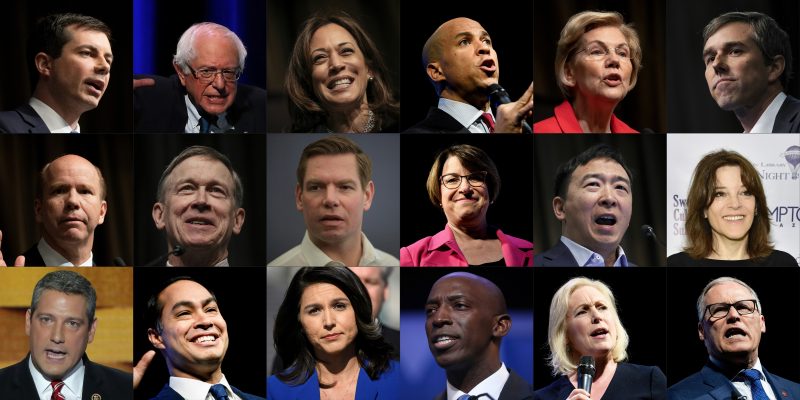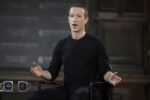Pipe dream or shrewd bet? Lesser-known Democrats in White House fight
The 18 Democratic presidential candidates (l to r) as of April 10, 2019: Pete Buttigieg, Bernie Sanders, Kamala Harris, Cory Booker, Elizabeth Warren, Beto O’Rourke, John Delaney, John Hickenlooper, Eric Swalwell, Amy Klobuchar, Andrew Yang, Marianne Williamson, Tim Ryan, Julian Castro, Tulsi Gabbard, Wayne Messam, Kirsten Gillibrand and Jay Inslee (Don Emmert, MARK WILSON, Drew Angerer, Brendan Smialowski, SCOTT OLSON, Eugene Gologursky, ALEX WONG, Eric BARADAT, JOE RAEDLE)
Washington (AFP) – With a record-breaking 18 Democrats already running to challenge President Donald Trump in 2020, the lower-tier candidates hang on, spending millions of dollars and countless hours on a fight almost certain to end in their defeat.
But their White House fantasy may not be just a pipe dream.
Each is optimistically hoping they can defy the odds, like Pete Buttigieg, until recently a rank outsider who has become a phenomenon in the early weeks of his campaign.
Should they fall short, a different victory may come within reach — either building name recognition by elevating issues close to their heart, positioning themselves for future elections, earning a cabinet post in an upcoming administration, or landing a plum commentator contract.
Trump was in the Oval Office all of six months before John Delaney became the first to launch the 2020 Democratic challenge, back in July 2017.
At 55, the former congressman has already poured a substantial portion of his personal fortune into the race. Nearly two years on, he barely registers one percent support in Democratic primary polling.
Delaney has company. Eight others are also garnering just one percent or less in support, outpaced in a recent Morning Consult poll by the generic category “Someone else.”
Would that not be enough to convince them to throw in the towel?
Not at all, argues Bill Sweeney, a former Democratic National Committee deputy chairman who is an expert at American University.
He recalls that in early 1975, little-known candidate Jimmy Carter stood at one percent in the polls. The Democrat ultimately won his party’s nomination and defeated Republican Gerald Ford in 1976.
– The Buttigieg effect –
“Everyone thinks lightning is going to strike,” Sweeney said of the presidential hopefuls.
For encouragement they need only look to the example of Buttigieg. The first openly gay presidential candidate from a major American party was so little known at the outset that he spend his first campaign days explaining how to pronounce his name.
But after impressive televised appearances, the 37-year-old military veteran and mayor of South Bend, Indiana, raked in $7 million in donations even before the official launch of his presidential run.
Buttigieg quickly rose from the one-percent ranks in late January to five percent in the polls, positioned firmly in the middle of the pack.
Even if they eventually fall short of the Democratic nomination, the also-rans will not leave empty-handed.
“If they do well and don’t succeed, they can still go home and run for governor, run for senator, perhaps be involved in a Democratic administration,” Sweeney said. “There’s a life after this.”
He noted that some candidates are passionately motivated by certain issues “and they want to have those issues be part of the debate,” such as climate change (Jay Inslee) and gun control (Eric Swalwell).
As for the millions of dollars they raise on the trail, these efforts are also not in vain.
Donor listings and networks of grassroots volunteers can be extremely useful in a future campaign, as Bernie Sanders has shown. The liberal senator lost his nominations battle to Hillary Clinton in 2016, but today he is an unofficial frontrunner and tops the donations race.
– ‘Future of the party’ –
“You can win even if you lose,” observed Larry Sabato, who heads the Center for Politics at University of Virginia. “There are book deals, speakers’ bureaus, TV pundit slots and so on, just waiting for those who don’t make it.”
Such perspectives may partly explain the growing number of candidates for the primaries. In 2016 it was the Republican horse race that ballooned to a then-record 17 candidates.
Eighteen Democrats are presently in the running, reflecting an unprecedented number of women and minority candidates.
Several more are still likely to jump in, including former vice-president Joe Biden, who dominates the polling despite not yet announcing his candidacy.
He is followed by Sanders, and six contenders who each claim more than one percent support: Kamala Harris, Beto O’Rourke, Elizabeth Warren, Cory Booker, Buttigieg and Amy Klobuchar.
The quiver of candidates could shrink once the party’s debut debates are held in June and July, and especially after the first several primary votes in early 2020.
Meanwhile, the diversity of candidates and the issues they give voice to is “healthy” for the Democrats, Sweeney said.
Especially, he added, if you consider the age of the second-tier hopefuls, most of whom are under 55: “that’s the future of the party.”
Disclaimer: Validity of the above story is for 7 Days from original date of publishing. Source: AFP.


